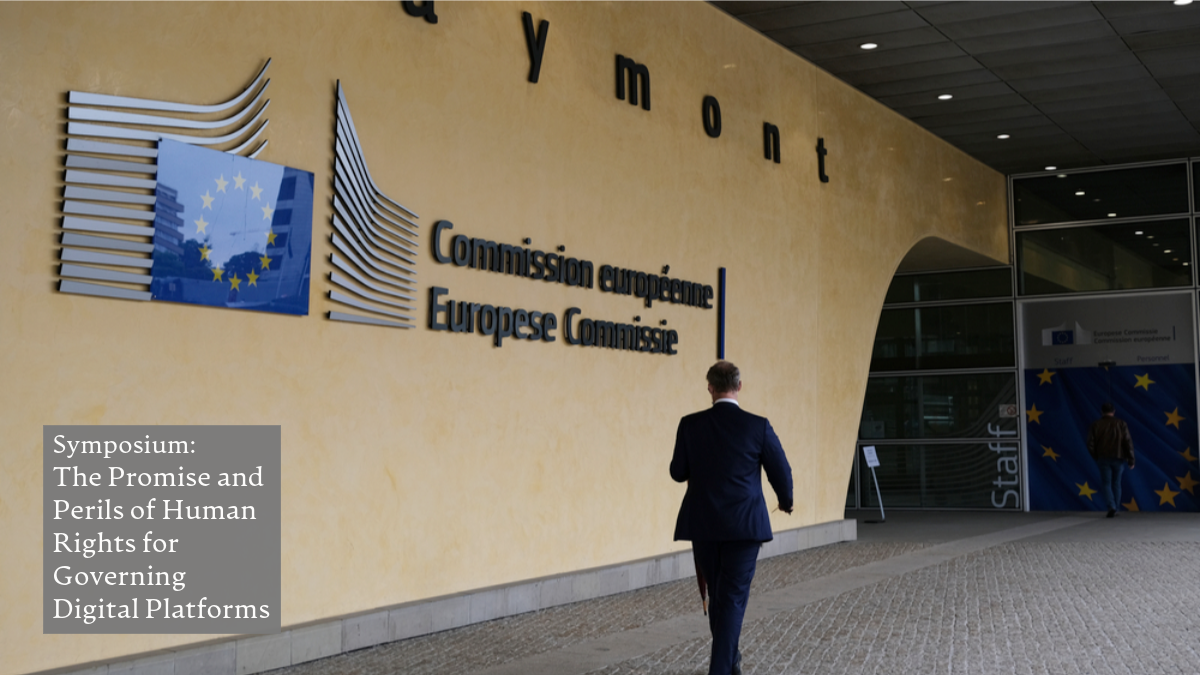A Brussels Affect
Petros Terzis, Joris van Hoboken / Jun 18, 2024This essay is part of a symposium on the promise and perils of human rights for governing digital platforms. Read more from the series here; new posts will appear between June 18 - June 30, 2024.

A pedestrian walks in front of the entrance to the European Commission headquarters in Brussels, Belgium on July 1st, 2021. Shutterstock
After decades of generative discussions, transformative negotiations, and passionate (boundary) struggles on potential socio-technical imaginaries for the future(s) of the Internet, a certain feeling of finality is looming in the horizon. As technologies of advanced computation rapidly coalesce into ever-expanding infrastructures of information and computation, and as value chains of technology production transfer materials and wealth from the Global South to Global North, ‘our’ digital world is showing determinate signs of an institutionally stabilized world order formed and sustained by dynamics of corporatism and legally constructed modes of governance. This is no longer (if it ever was) just about human rights, markets, competition, and innovation, but about sovereignty, power, and control over the flow of capital and information in a deeply fragmented -yet globalized- world.
Europe, with its centralized regulatory apparatus and an acquis communautaire centered on human rights and the rule of law, has been leading the ‘race’ for the stabilization of this kind of order. To that end, for quite some time now scholars and policymakers in/from Europe have been theorizing, advocating, and taking pride for the effect that Brussels has had on the ideation, formulation, and dialectics of technology regulations worldwide.
A few decades in and the Brussels Effect (a term used to describe precisely this globalizing effect of EU’s regulation) is as much a regulatory phenomenon as it is a policy quest and a political project; a self-reinforcing priority capable of exerting a form of policy pressure that is independent of any other institutional variables (the societal demand for regulation, the timing of the regulation, the processes and balances of the legislative process etc). Brussels, in other words, must be the first to regulate digital ‘stuff.’ From foundation models to platform workers, and from health data to quantum chips (whatever these might look like in the future), EU policymakers seem to be in a perennial state of constitutional anxiety to reaffirm their role as the ‘standard-setters’ of global digital regulation by leveraging their internal market dynamics and the EU’s broader strategy for European integration. Being the ‘universal standard’ has thus become an end in itself.
International lawyers would probably warn us at this point that ‘we have seen this scene before.’ Universalism, diachronically expressed through different vernaculars (from the ‘civilized vs barbaric’ binary, to Enlightenment, and science) has time and again offered its self-legitimizing power to various normative and intellectual ideas and movements. In such a context, international law and, more recently, human rights were/are imagined as the primary ingredient of the post-war international legal order; the standard that all states must mirror and abide by if they want to ‘improve’ and/or be accepted as equal amongst equals in the ‘international community.’
Amidst a frenzy of legal developments, endless trilogue meetings, and pompous political statements, perhaps the time has come for scholars and policymakers to stop, take a breath, and look back. Seeing the vast power asymmetries in the production of information and computing technologies; the harm that these technologies (can) cause on people and communities; and the market-driven and/or market-enabling nature of the EU’s ‘world-leading’ regulatory interventions, we believe that it’s time technology lawyers in the EU/Global North confronted the reality they/we have ended up creating. The persisting and expanding nature of data extractive practices, the consolidation of ad-driven business models as the standard for online service delivery, the labor conditions of content moderators in countries of the Global South, the proliferation and legitimization of technologies for mass surveillance here and abroad, the double-standard for data protection and privacy at European borders, the ever-presence of ridiculously insulting cookie banners across the Web, the influential policy persona of OpenAI CEO Sam Altman, the disinformation campaigns during wartime, the proliferation of hate speech, the impact of social media on children’s mental health, and the impact of digital services on the environment were versions and illustrations of only one of the possible digital worlds we could have had today; and it is the one we ended up having because of the standards we used to channel through our institutional imagination, our money, and our time.
We therefore believe that, precisely for what we technology lawyers and policymakers in the EU and Global North have done to these possible worlds – and for what we have led others to do – we need to talk.
The Brussels Effect has been our methexis. We theorized it, we celebrated it, we championed it. Our expertise was finally needed in global fora, and we took pride in others mimicking our actions. We did not just have a seat at the table. We were the table. And, frankly, we enjoyed it. In fact, we liked it so much that we ended up forgetting what it is that we like and ignoring what it is that makes others like us. Even when this institutional memory of ours was gone, our self-admiration persisted. We felt heard when prominent figures of the technology realm sought our counsel. We felt good doing ‘something’ even if we knew it was (close to) nothing. And we posted funny memes on Twitter to celebrate a ‘first’ and ‘world-leading’ legislative act, even if we did not actually have one at hand.
Those of us who find that this system – with its fossilized thinking patterns and mental maps – is failing us, no matter how many human rights impact assessments Big Tech’s compliance offices will end up producing, or no matter how huge the fines they will be forced to pay will be, need to seriously reflect on the role of the European Union in (infra)structuring a messy, highly unequal, and extractive digital environment. To do so, there are at least three closely interlinked steps that are necessary: one normative, one epistemological, and one methodological.
Firstly, we need to challenge the assumption that European digital policy, the Brussels Effect and its manifestation in the digital policy space, were necessarily something good for us and the rest of the world. Having one central regulatory node has been as much a standard for rule-making as it has been a gravitational field for the consolidation of regulatory logics and, inevitably, lobbying forces. We need to review the assumptions that we took for granted when pondering ways to regulate technologies and platforms; to engage with questions of world-making about the kind(s) of digital transformations we and others want to see materializing in our world; and to empirically evaluate the impact that our digital policies have had on people and communities outside our ‘neighborhood’.
Secondly, we need to study the way our legal vocabulary and mental maps have evolved and their (non-)alignment with the technological transformations on the ground. We can no longer accommodate the affordances and production logics of modern technologies based on regulatory frameworks and thinking patterns that emerged from the technologies of the past. An intermediary that hosts a blog is nothing like an online platform that monetizes engagement. A server that we set up to host our website is nothing like the cloud that invites applications and dependencies. A CPU-run personal computer that we use to access the Internet is nothing like the smartphone we have in our pockets as a phone, gadget, wallet, identity verifier, proximity sensor, or AI assistant. Building the capacity to understand technological transformations and translate their relevance for/to law and policy will require the formation of novel epistemologies. In other words, the law and technology space needs ‘new lawyers’ more than it needs new laws.
Thirdly, in terms of method, technology lawyers do not have to reinvent the wheel or settle for another interdisciplinary project when exploring new ways of working and thinking. Other disciplines, histories, and epistemic communities have been, for decades, contemplating issues and questions that we now find worth exploring. The rise of private power in the national and international arena; the impact of technologies of Global North on the Global South; the (in)adequacy or cost of the existing human-rights framework as a standard to live and organize our societies by; the role of money and venture capital in shaping technologies; all these are questions that are novel only if one has not looked well enough. Engaging with these lines of work may inspire us to explore new methodological avenues (within/beyond the doctrinal approach) for the legal academy and alternative pathways for legal practice.
To conclude, for over a decade now, Brussels has been the epicenter of technology regulation; the gravitational field that pulled together money, political capital, and expertise to mold a ‘digital’ order that quickly transformed into our institutionalized (global) reality. Regulation of technology had become an end in itself and the success of the endeavor was measured by the ability of striking compromises between interests that seemed competing. Alas, they were not. For where EU policymakers went bearing goals and interests, others brought along their visions and strategies.
If we are to learn from the legal and regulatory practice of the past, we technology lawyers need to understand that we do not hold the keys to the future. Instead, private actors, government officials, market orchestrators, and aspiring market-makers are the ones who have value-laden visions for the future as well as the financial, human, and institutional capital required to materialize and stabilize them. To decode their visions and presage the future they aim at achieving, we need to study their incentives and trajectories, usually enclosed not in what regulations attempt to encompass, but in the routines of socio-technical practice, the legally constituted infrastructures of materials and logistics, and the breeding ground of private and transnational law that altogether form the backbone of the entities that sustain and advance the conditions of our individual and collective lives.
Authors

